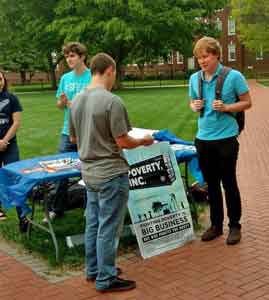
The University of Delaware BRI chapter is proud to screen Poverty, Inc. to students and faculty. It is a bold look at “the business of doing good.” Please join us for refreshments and lively discussion following the film.

From the film’s website:
“The West has positioned itself as the protagonist of development, giving rise to a vast multi-billion dollar poverty industry — the business of doing good has never been better. Yet the results have been mixed, in some cases even catastrophic, and leaders in the developing world are growing increasingly vocal in calling for change. Drawing from over 200 interviews filmed in 20 countries, Poverty, Inc. unearths an uncomfortable side of charity we can no longer ignore.”
POST-EVENT SUMMARY: Seven students attended the screening.
From University of Delaware BRI chapter president, Zachary Howell:

“The week before the screening, the event planners (BRI chapter VP, Young Americans for Liberty (YAL) president and VP, and I) had a pre-watch event so that we could talk about the movie effectively at the tabling event we planned to hold prior to the event to garner interest and be able to speak to the detrimental effects of foreign aid.
“During the day on May 9th, BRI and YAL held this tabling event. The tabling was very effective in opening people’s eyes to how foreign aid affects the communities of third-world countries. It seemed to be less of a problem of disagreement, but more so one of never considering that there were adverse effects of current measures of fighting poverty. The head of academic enrichment at the school seemed to really like our table and spent about ten minutes discussing foreign aid and going through the books we had on display (Lessons from the Poor, by Alvaro Vargas Llosa; Dead Aid, by Dambisa Moyo; The Bottom Billion, by Paul Collier; and, The White Man’s Burden, by William Easterly). The event was worthwhile in getting people to consider that there was another viewpoint; unfortunately, many could not attend the viewing because they had to study for tests.
“That night we played the movie in a classroom at the school. I began the event with a few questions to think about that I took from the supplementary materials. These included “What is poverty?”, “What is charity?”, “What is something you can do to help the poor and what is the likelihood that you will actually do it?” and a few others. Those who came really liked the movie and seemed to be very engaged with it while it was playing. After the video, everyone stayed for a post-movie discussion. I had prepared a few things to say for after the move to wrap up the pre-movie questions and a few things that I thought were important to know when they left. I talked about how reducing charity to writing a check really cheapens what charity can actually be for people. I also told how the movie changed my future plans. I had always thought I wanted to help with delivering health care to Latin America since part of my family is from Venezuela and Mexico, but this movie taught me that the best way to rectify the situation is to work to teach the actual medical professionals in the various communities, rather than a one-time “Doctors Without Borders” style treat-and-leave program. I also told how the purpose of this movie is not to change your desire to help the poor, but rather to fine-tune our perception of poverty and the capabilities of those who find themselves in poverty.
“After, there were some questions from those who attended and I was very satisfied by the questions they asked because they showed a great deal of personal reflection and interaction with the content of the video.”